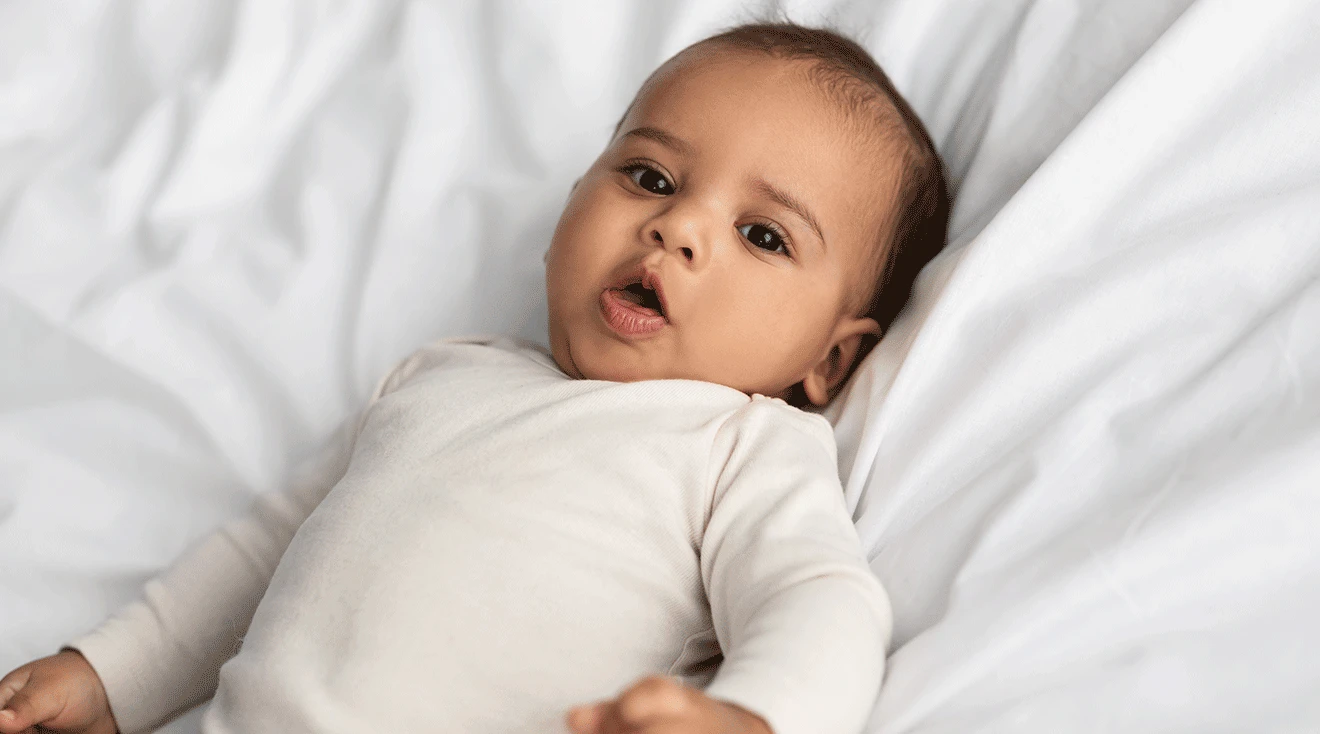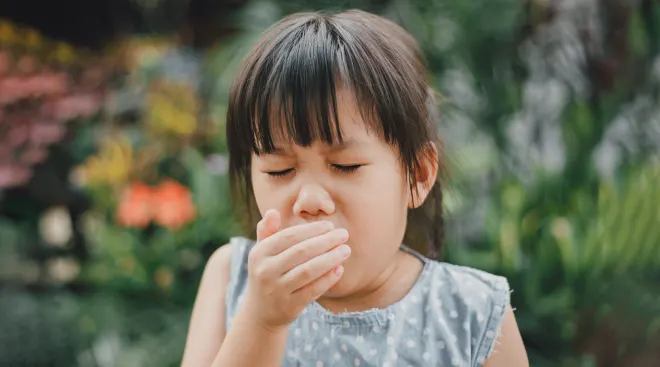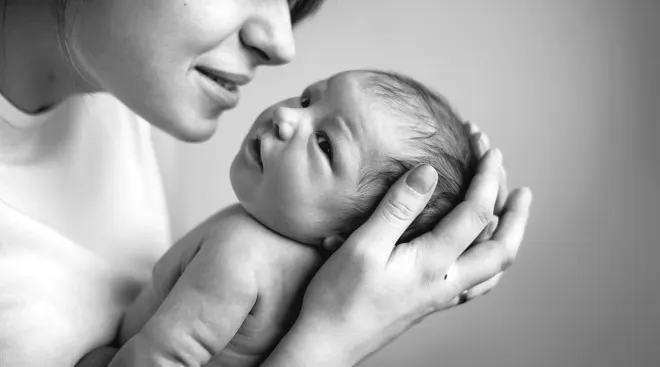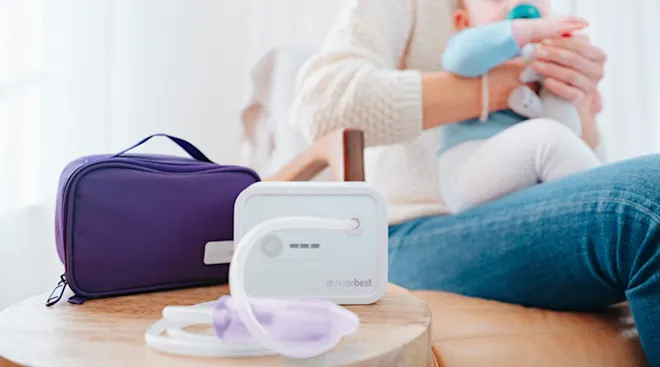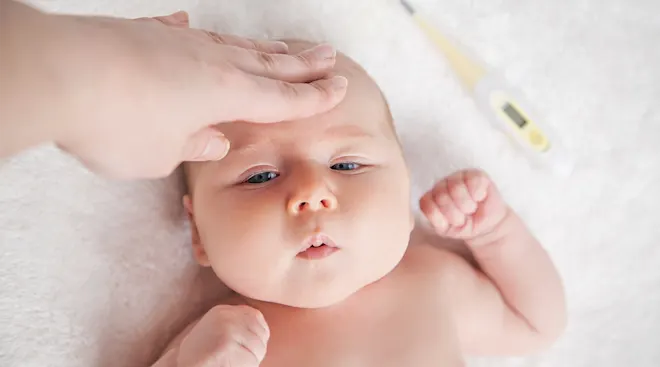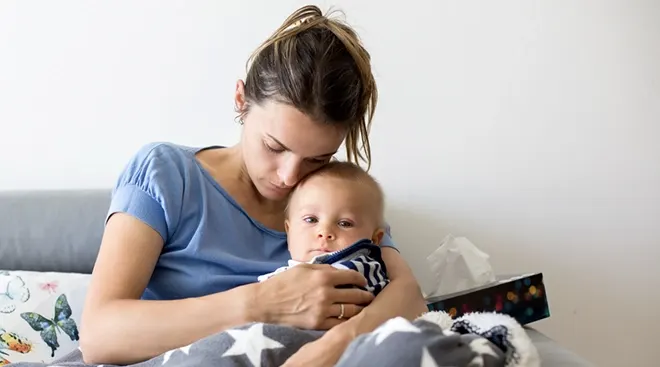What to Do When Baby Has a Cough
There’s nothing like a baby cough to stump parents—after all, it can be hard to know if it’s something serious that needs to be checked out, or something small that just needs to run its course. Needless to say, finding the cause of baby’s cough can be stressful, especially if baby’s coughing at night and keeping them awake. But, while a cough can be uncomfortable for baby and nerve-wracking for you, it’s extremely common, says Benjamin Nelson, MD, director of pediatric bronchoscopy at Mass General Hospital for Children in Boston. So when is an infant cough no big deal, and when does it progress to something more serious? And what are the best baby cough remedies to try? Here, experts break down everything to know about an infant cough.
In short, coughing is a biological reflex that works to protect your lungs and airways and ensure they remain clear, explains Loretta Cody, MD, a board-certified pediatrician based in Connecticut.
“The question that often worries parents is what the cause of the cough might be—and it can range from something as simple as irritation from an environmental trigger (like smoke or dust), to mucus (for example, from a virus) to reflux (from [stomach] acid),” says Krupa Playforth, MD, a pediatrician at Warm Heart Pediatrics in Northern Virginia and founder of The Pediatrician Mom.
Wondering if you might be able to tell what’s causing baby’s cough from the sound? Playforth notes that while that may be possible in cases (like with croup—more on that later), it’s not always realistic. “Coughs can sound different depending on which part of the airway is irritated. For example, bronchiolitis is irritation of the small airways in the lungs—the bronchioles, while croup is irritation of the upper airway,” she explains. “Some coughs are wet sounding, and this is often in association with post nasal drip and mucus drainage.”
Why is baby coughing worse at night?
Hearing baby coughing in their sleep can be concerning for many parents. Unfortunately, Playforth says that many infant coughs do become exacerbated at night. One of the biggest reasons for this is nasal drainage that can run down the back of the throat, a condition commonly known as postnasal drip. “Instead of excess mucus coming out of the nostrils, when a person lays down, that drainage goes backwards (due to gravity),” she explains. “It can more easily irritate the upper airways and lead to more coughing.” She also notes that coughing due to asthma may also worsen at night, but research hasn’t demonstrated exactly why.
There are many different types of infant coughs—and they may sound different based on their cause. If your child is eating, breathing and sleeping normally, a cough isn’t usually anything to worry about and should resolve on its own. Nevertheless, it’s something to monitor, since it can progress to something more serious.
Before you can determine exactly what to do when baby has a cough, you need to suss out what’s causing it. Knowing the difference between the various types of coughs can help you—and your child’s pediatrician—know what to do next. Below, different types of infant coughs to be familiar with.
Baby dry cough
A baby dry cough basically means there isn’t any mucus production involved, Playforth says. It’s an ‘unproductive’ cough,” she adds. Dry coughs in babies may be caused by irritation or inflammation somewhere in their airway. It can accompany the start of a cold or infection, or it may indicate allergies. For example, if you notice the infant cough more when your child goes to sleep, they could be allergic to dust mites, explains Gina Posner, MD, a pediatrician at MemorialCare Orange Coast Medical Center in Fountain Valley, California. According to Playforth, if baby has a dry cough, they could also be allergic to pollutants or be suffering from asthma.
Wet baby cough
In a nutshell, a wet baby cough means mucus production is involved—and the cough may help to get it out. While adults usually spit these secretions out, babies usually just swallow them. A wet baby cough may occur due to “ongoing inflammation due to an irritant, like dust,” Playforth says. “[This] can lead to increased mucus production as the body tries to clear the irritant.” Or, it can indicate an upper respiratory infection, like the common cold, or lower respiratory tract infections, like pneumonia, which can range from mild to serious, she says. (According to the American Academy of Pediatrics (AAP), pneumonia may be accompanied by fever, vomiting, lethargy or difficulty eating and breathing, all of which are signs to call baby’s doctor.)
Whooping baby cough
This is usually a really forceful cough and comes with a distinctive noise—and a whooping sound is a solid indicator your child has whooping cough (aka pertussis, which is preventable through routine vaccination). “A lot of times, younger kids will make a typical ‘whoop’ sound when they have whooping cough,” Posner says. They may cough a few times, and then you’ll hear the “whoop” when they breathe in.
As the Centers for Disease Control and Prevention (CDC) notes, the early stages of whooping cough can resemble a common cold. For this reason, it’s usually hard to diagnose until baby’s whooping cough becomes more evident. However, “it’s important to know that not every infant who has pertussis infection will make the classic whoop sound,” Playforth says. Whooping cough can be serious, so flag baby’s symptoms with your pediatrician as they emerge.
Barking baby cough
With this type of baby cough, your child will make a sound similar to a barking seal, Posner says. A barking baby cough is the hallmark of croup, an inflammation of baby’s larynx and trachea that narrows and partially blocks baby’s upper airways, making breathing difficult. “We usually see this in young infants and children, who have more narrow airways in the first place,” Playforth says. Croup is the most common cause of a barking cough in babies and is usually caused by viruses like parainfluenza (different from influenza), as well as allergies and congenital conditions, she adds.
According to the AAP, croup may get worse in the middle of the night. You can treat croup at home by keeping baby calm with a backrub or favorite toy, as well as with lots of fluids and Tylenol, as needed (with pediatrician approval for babies under 6 months). However, if baby’s barking cough is accompanied by high-pitched breathing (known as stridor) and other respiratory symptoms, call your child’s doctor. “It’s important to reach out to a healthcare professional so they’re aware of what to watch for and when a child may need to be seen,” Playforth says.
Wheezing baby cough
A wheezing baby cough occurs when your child makes a high-pitched, whistling sound while exhaling or coughing—and it could be a sign of bronchiolitis (an inflammation of the bronchioles) or asthma, Posner says. It may also indicate RSV, Cody adds. If you hear a wheezing cough from baby, bring it to your doctor’s attention, as it could indicate breathing difficulty.
Baby cough with difficulty breathing
According to Cody, any type of baby cough can lead to breathing difficulties, but some—such as RSV, bronchiolitis, asthma, pneumonia, etc.—are more likely to cause stress. One of the best things parents can do is familiarize themselves with signs that baby’s having trouble breathing. If baby’s working extra hard, the muscles between the ribs are pulling in with each breath, if they’re breathing rapidly (50 breaths per minute) or turning pale or blue, get medical help immediately.
Ultimately, there are several different types of infant coughs, and each may occur for several reasons. The best way to ensure baby stays happy and healthy is to reach out to your pediatrician with any questions and concerns.
While you may be anxious to clear up that infant cough stat, the reality is that you and baby might be dealing with it for longer than you think. “Some studies show that the average length of a cough is 21 days,” Posner says. For some babies, it might get better sooner, but for many, it takes even longer. That doesn’t mean your child is going to be hacking the entire time, but they may still have a lingering cough after three weeks.
When an infant cough sets in, it’s natural to ask how to help a baby’s cough and want to clear it up right away—especially if your little one is uncomfortable. Ultimately, the best cure for baby coughing is time, Posner says. Plus, Playforth reminds parents that, though annoying, coughing is a normal reflex and helps the body get better. “If your child is coughing but still able to sleep and feed comfortably, and remains playful, then they do not necessarily need a remedy, especially for a cough that has only lasted for a few days,” she says.
Is baby cough medicine safe?
The US Food and Drug Administration doesn’t recommend cough medicines or syrups for kids under 4. Firstly, “a cough is a protective mechanism, and is necessary for the child to get better,” Nelson says. “Cough medicines also contain ingredients that make it easy to overdose if you give your child too much.” According to the AAP, the risks of using baby cough medicine outweigh any potential benefits. In fact, Nelson adds that studies have shown that cough medicine isn’t any more effective at suppressing baby’s coughing than a placebo. If you’re concerned about baby’s symptoms and how to best treat them, consult your pediatrician.
If you’re looking for safe ways to make your little one feel better, there are a few baby cough remedies you can try at home. But, remember, “the best home remedies for coughing in infants are the simple ones,” advises Playforth.
-
Humidity: Steam can work wonders for baby coughing, since it helps break up the mucus. Run a hot shower until the bathroom has filled with steam, then sit with your child in the room for 10 to 15 minutes. You can repeat this morning and night. You can also run a cool mist humidifier near baby’s bed overnight to keep the air from drying out, Cody says.
-
Nasal suction: “I think every parent should always have nasal saline spray and an effective snot sucker in their medical kit for those moments when congestion and a cough are disrupting sleep or feeding,” Playforth notes. “Some babies may be more comfortable with a saline mist rather than spray,” she adds. You can use nasal saline drops or spray to thin out baby’s mucus and a suction bulb to help clear their stuffy nose, especially before baby sleeps or eats—just limit this to four times a day. “Don’t be too aggressive, as it can cause irritation and swelling,” Nelson cautions.
-
Hydration: Make sure baby drinks plenty of liquids to stay hydrated, Cody advises. When there’s enough water in the body, the mucus the body generates becomes thinner, making it easier to clear.
-
Honey: If your child is one year or older, giving them 2 to 5 mL of honey can thin out mucus, ease their sore throat and help them sleep better at night, Posner suggests. Playforth agrees, saying it’s “been found to decrease night-time cough frequency and to improve sleep in children.” Just remember that honey isn’t a safe remedy for babies under one, since it poses a risk of infant botulism.
-
Chest rub: According to the AAP, mentholated chest and throat rubs for kids aged 2 and over may be helpful in alleviating symptoms. However, be cautious about its ingredients, as some rubs and essential oils may actually make baby’s cough worse. “For example, products containing eucalyptus have been known to trigger bronchospasm (spasm of the airways) and wheezing in children,” Playforth explains. Check in with your pediatrician before using a chest rub on your toddler, and, of course, always keep it (and all other medicines) out of your kiddo’s reach.
“If a child is doing all their normal activities—sleeping at night, eating, drinking and playing—you can usually let the cough work its way out,” Nelson says. But if you notice any of the following, he and Playforth say it’s time to call your doctor:
- Decreased eating
- Lack of energy
- Trouble sleeping at night
- Persistent fever
- Vomiting
- Worsening cough or cough that lasts for more than a week to 10 days
- Cough with other symptoms, like wheezing, stridor (high pitched breathing sounds) or rapid breathing
- Difficulty breathing (i.e. if baby is grunting or flaring their nostrils with each breath, or if the muscles and skin between the ribs are pulling in and out with each breath)
You’ll also want to stay on alert if your infant is under 3 months of age with a baby cough. “Newborns have smaller airways and less reserve, so while a cough is not a reason to panic, we often pay closer attention since younger babies can get quite sick quite quickly,” Playforth says. Plus, due to their narrowed, less developed airways, newborns may present their symptoms differently from older infants, even if they’re caused by the same infection—and they may be more severe.
Of course, don’t hesitate to call your pediatrician’s office anytime with concerns. “Any cough that is worrying a parent is reasonable to discuss with your pediatrician,” Playforth says.
[Babies get sick](https://www.thebump.com/a/what-to-do-when-your-baby-is-sick, thanks to their developing immune systems. But there are some ways to keep those baby coughs and germs away. Below, Cody and Playforth list some ways to build healthy habits in kids:
- Practice good hand washing
- If you’re child is sick, make sure they stay home
- Keep your child updated on their vaccinations
- Avoid contact with people who are sick or symptomatic until they feel better
- Avoid exposing your child to cigarette smoke
- Keep checking in with your pediatrician about any existing or underlying conditions your child has (like asthma)
Please note: The Bump and the materials and information it contains are not intended to, and do not constitute, medical or other health advice or diagnosis and should not be used as such. You should always consult with a qualified physician or health professional about your specific circumstances.
Plus, more from The Bump:
Loretta Cody, MD, is a board-certified pediatrician based out of Connecticut. She received her medical degree from New York Medical College and completed her residency at Yale New Haven Hospital.
Benjamin Nelson, MD, director of pediatric bronchoscopy at Mass General Hospital for Children in Boston. He earned his medical degree from Georgetown University and completed his residency at the Massachusetts General Hospital.
Krupa Playforth, MD, is a pediatrician at Warm Heart Pediatrics in Northern Virginia and founder of the Pediatrician Mom. She earned her medical degree from the Vanderbilt University School of Medicine and completed her residency at Georgetown University.
Gina Posner, MD, is a board-certified pediatrician at MemorialCare Orange Coast Medical Center in Fountain Valley, California. She has spent more than a decade volunteering with a number of organizations in both the US and the Dominican Republic, educating both parents and children on topics of health. Posner earned her medical degree from New York Medical College.
American Academy of Pediatrics, Pneumonia in Children, October 2020
Centers for Disease Control and Prevention, Pertussis Signs and Symptoms, August 2022
American Academy of Pediatrics, Croup and Your Young Child, January 2022
US Food and Drug Administration, Should You Give Kids Medicine for Coughs and Colds?, January 2023
American Academy of Pediatrics, Coughs and Colds: Medicines or Home Remedies?, December 2022
Current Opinion in Allergy and Clinical Immunology, Codeine and cough: an ineffective gold standard, August 2010
Learn how we ensure the accuracy of our content through our editorial and medical review process.
Navigate forward to interact with the calendar and select a date. Press the question mark key to get the keyboard shortcuts for changing dates.

































